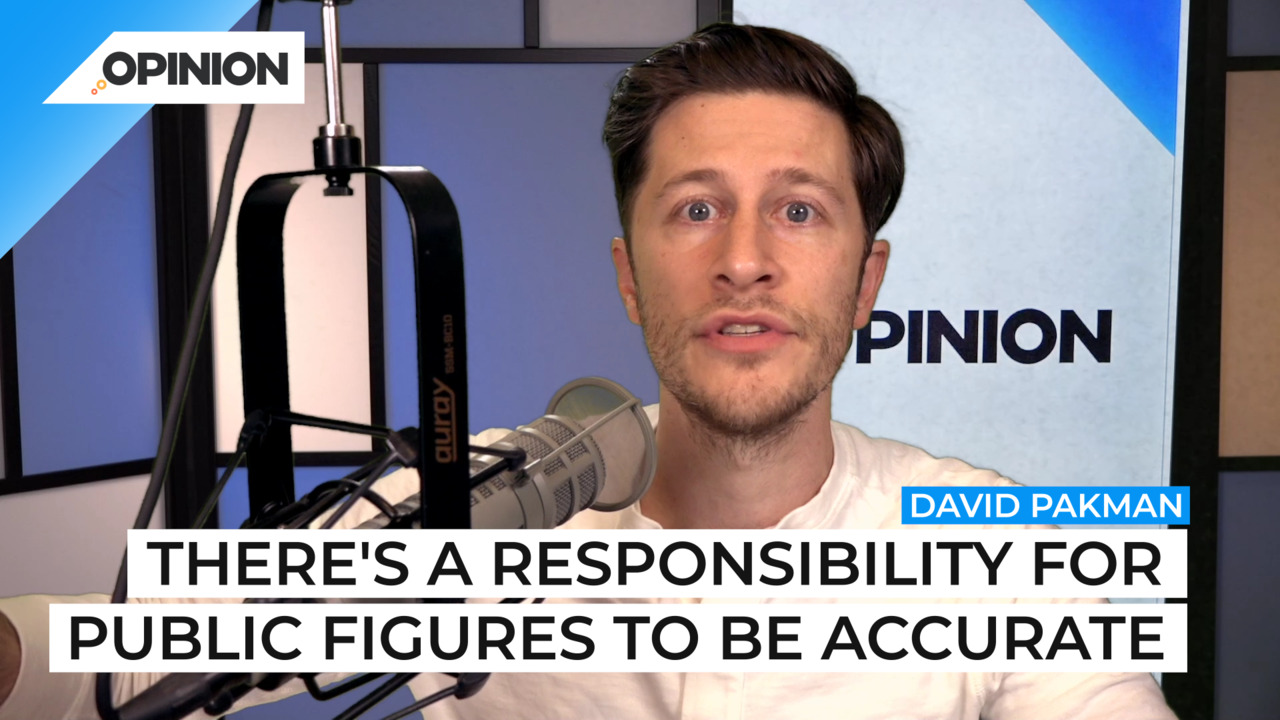
Commentary
-
Our commentary partners will help you reach your own conclusions on complex topics.
Alright, let’s talk about the latest Alex Jones settlement. As some of you may have followed, there was a first Alex Jones defamation case in Texas. That is the case that led to a verdict of nearly $50 million dollars. And we actually spoke to the plaintiff’s attorney Mark Bankston after that. And his belief was that that was only the start, that, in fact, there were going to be multiple more awards that Mark Bankston believed would end Infowars. And it appears as though that is indeed the direction that is going. We now have the Connecticut defamation case in which the total awards against Alex Jones, that he will have to pay a number of families related to victims of Sandy Hook, $965 million dollars. Now, in all of these types of cases, there are questions about what can you collect? A jury verdict is one thing but what can you collect?
The attorneys are going to deal with that. But there has been a real confusion maybe, or I’m kind of putting the most positive spin on it. Maybe some bad faith claims made around these verdicts, that people like me, are taking joy in what is essentially the censorship of Alex Jones, by destroying his livelihood, by making him pay out all this money that he doesn’t even have.
That could not be further from what is actually going on. So let’s actually talk about that.
When I say things, on the platforms I have, I have a responsibility. And depending on how potentially injurious or damaging what I am saying is, if untrue, I take even more seriously my responsibility.
So to give just like a banal example, if I’m mentioning who I think was in a particular movie from 20 years ago, I want to get that right. But it’s not really a high stakes thing. If I say, oh, you know, was it, uh, who played Batman in the 1990-ish Batman movie with Jack Nicholson? Oh, if I said instead of Michael Keaton, I named some other actors, you know, it’s kind of like no big deal.
And that’s fine. Nobody’s really damaged by that. On the other hand, if I’m going to start making claims about whether alleged victims of a crime are faking it, or are crisis actors, or any of the things that Alex Jones said, I want to be 110% sure that I’m getting that right. And if I get it wrong, as soon as I know that I got it wrong, or might have gotten it wrong, I’m going to do everything I can to find the truth and to correct that truth on the record.
And that responsibility was so ignored and squandered by Alex Jones, that it is correct that there be a serious penalty. So this isn’t about censorship. This isn’t about free speech. This is about, first of all, we have something called defamation. And when you can prove defamation in a court of law, it’s by definition not about free speech.
And beyond that, there should be consequences commensurate with the bad act. Now, it’s always the case with civil suits and jury verdicts, that people can get involved in this sort of like, is the verdict fair? Is it too high? Is it too low?
Well, how do you compare what the families of the Sandy Hook victims should get to the woman who had the hot coffee spilled on her from McDonald’s and all these different things? It is extraordinarily fraught to do that as an outsider both because there are jurisdictional differences between states when it comes to defamation suits and awards. There are factual differences.
The law is different where a defamation versus a negligent incident like a slippery walkway or hot coffee. These are all completely different things. And so while, from our point of view, we could say, well, what would be tougher for me getting burned with coffee or having Alex Jones lie about Sandy Hook? Well, I don’t know, it feels this way or that way. It’s very fraught. That’s not really the way we should be approaching it.
The way that this should be approached is Alex Jones has a platform on which he can say whatever he wants. Sometimes, what you say can be incorrect. And sometimes, depending on the context of the incorrect things that you say, it can be defamatory. And by its nature, states put a cap on what can be awarded.
What Alex Jones did is such a misuse of a public platform that the punishment should be very serious financially and that’s what juries have so far found. What will be collected remains to be seen.
Will this end Infowars? Remains to be seen. But this is not an issue of free speech. And it’s not an issue of censorship.
-
JD Vance doesn’t add much to Trump ticket
At the 2024 Republican National Convention, GOP presidential candidate Donald Trump selected Sen. J.D. Vance, R-Ohio, as his running mate. With Trump expected to win Ohio in the Electoral College, some observers have questioned why Trump ultimately decided on Vance. One explanation is that Vance said he would have helped Trump overturn the results of…
-
How likely is a landslide victory in November for either candidate?
With President Joe Biden’s poor debate performance and the recent attempt on former President Trump’s life, some Democratic lawmakers are warning of a landslide Republican victory and urging Biden to step aside. But three new major national polls show signs of hope for Biden’s argument that he must remain the Democratic nominee. Watch the above…
-
Should Biden step aside or not?
President Joe Biden looked and sounded notably less healthy than usual during his recent debate against Donald Trump. Biden’s performance set off alarms for some Democrats, who began discussing the possibility of running an alternative candidate. While there may be promising candidates waiting in the aisles, it’s not clear if or how Biden could or…
-
How Biden can win Florida
Donald Trump is currently projected to win Florida again in 2024, just as he did in 2016 and 2020. But, in response to Republican Florida Gov. Ron DeSantis’s legal and cultural war against the Left — including what liberals say is a war on women’s rights, education and free speech — many Floridian voters appear…
-
Donald Trump is mentally unwell
Medical experts and observers have long questioned Donald Trump’s mental and psychological health, with malignant narcissism appearing as the most consistent diagnosis of Trump’s supposed illness. Those discussions have fallen to the sidelines in recent years, but resurfaced in response to certain speeches and behavior from the former president. Watch the above video as Straight…
Latest Opinions
-
 U.S. Department of Defense
U.S. Department of Defense
Congress still trying to figure out how to reduce wasteful military spending
-
 DVIDS
DVIDS
US Navy, Air Force making waves with new weapons at RIMPAC
-
 Getty Images
Getty Images
Israeli PM Netanyahu meets with Trump at Mar-a-Lago
-
 Getty Images
Getty Images
Growing US nuclear power resurgence reaches the nation’s heartland
-
 Getty Images
Getty Images
Beer from the sun, other solar thermal projects get government funding
Popular Opinions
-
In addition to the facts, we believe it’s vital to hear perspectives from all sides of the political spectrum.


